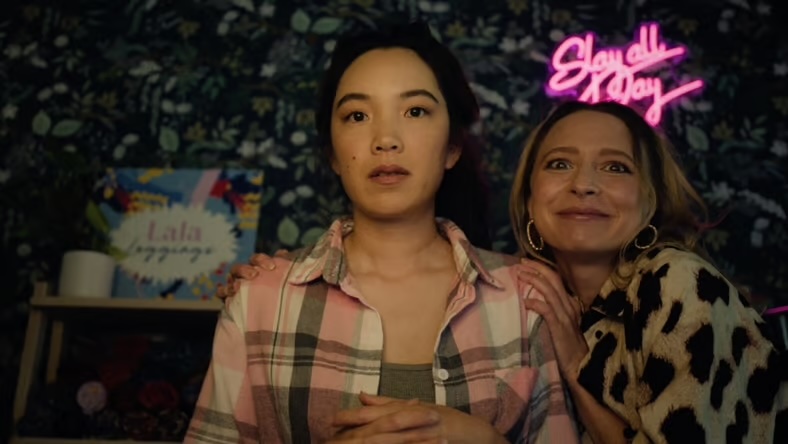MLM
Dir. Brea Grant

Brea Grant’s MLM follows a debt-stressed millennial, Sarah, through her participation in a legging-centric pyramid scheme in an attempt to make some easy money. After all, the vaguely sinister, barely satiric (in the sense that it’s hard to make the content it riffs off of any more ridiculous) ad the film opens with promises of Girlboss status and wealth, seemingly without effort, all while sitting at home! However, things quickly spiral out of control as Sarah fails to reach sales quotas despite her desperation-tinged, ring-light-framed Instagram Live sales sessions, and soon, Sarah experiences consequences ranging from comically disturbing to downright murderous.
There are very few things that keep me up at night. Growing up, I was scared of everything. Kidnappers, rattlesnakes, serial killers, ghosts, being thought of as uncool, spiders, demons, singing in public. Unsurprisingly, for most of my life, I was unable to watch horror movies. Then, during the first year of Covid lockdown, I became obsessed. In 2020, I watched 60 horror movies; in 2021, 80. I desensitized myself to the degree that my rewired brain doesn’t even conjure nightmares anymore, or if it does, I find them more entertaining than frightening.
The things I do get anxious about enough to lose sleep over are, at least to me, “real” fears. Being unable to get a job that justifies having gone into student loan debt, getting injured without healthcare, my cat getting sick (again) and the accompanying vet bills, my mental health deteriorating, the numbers in my bank account. Unlike being possessed by a demon or stalked by an axe murderer these are all possible (conceptually an axe murderer could stalk me but the odds are statistically pretty against it), some of them are realities. The most memorable horror movies often contain slivered versions of our fears and ourselves.
Watching MLM, I was confronted with fears that aren’t so far from reality. Sure, no one’s penis is turning into a live animal, food isn’t suddenly becoming inedible, that axe murderer remains statistically unlikely. But the real fear at the heart of Grant’s short is financial anxiety, the precarity of maintaining a stable life in America with which so much of the country lives. The almost manic terror Sarah feels while trying to sell multicolored leggings on Instagram Live is a desperation tightly woven into late-capitalist work culture. The hopelessness of watching while others succeed at their legging-funded American Dream (at least, the millennial version of it) while she flounders to do the same, unsure what she’s doing wrong or if she’s just inherently incapable of success is a familiar one. As her failures continue, the consequences compound until they threaten to literally split her head open.
Sarah, like so many Americans, lacks community and the support it can provide. Her husband is about as interactive as a goldfish and she never even considers reaching out to him for help. The only other person in her life is her “upline,” the Instagramably perky Molly, who got her into the pyramid scheme in the first place and is only superficially interested in Sarah’s well-being until her own life is put in danger by Sarah’s inability to reach her sales quota. Sarah’s situation is particularly scary because she is alone—her husband can’t even see the punishments that La La Leggings inflicts on her. Molly is cheerfully unconcerned about Sarah’s situation until it directly becomes her problem. The successful La La Leggings “family” members aren’t a community for support but rather a source of further isolation.
As they smile through their own sales sessions and lounge at home in #OOTD post-worthy ensembles while chastising her for not selling enough, they flaunt the apparent ease of their success and extoll the fun they’re having selling leggings in front of the webcam, the implicit message is obvious: I made my money and my life is great, so what’s wrong with you? Just like the cutesy-cringe millennial tee shirts the La La Leggings girls wear in their commercial, the message is deeply familiar to anyone who’s spent any time on Instagram—a space that supposedly connects us but only allows us to see the very best versions of each other’s lives, that alienates rather than brings together. Sarah is only freed from her entrepreneurial hell when she gives up on the illusion that she could be the kind of Girlboss that Molly appears to be, but she’s no better off than she started, with no community and no obvious source of income. Grant leaves her protagonist and her viewers alone and uneasy—the fears at the heart of MLM are inescapable, in Sarah’s reality and ours.
Cloe Wood studied political science and creative writing at the University of California, Berkeley. She writes, watches horror movies, and works for money in Brooklyn, New York. You can find her work if you say her name three times and look in the bathroom mirror, or with a Google search.
